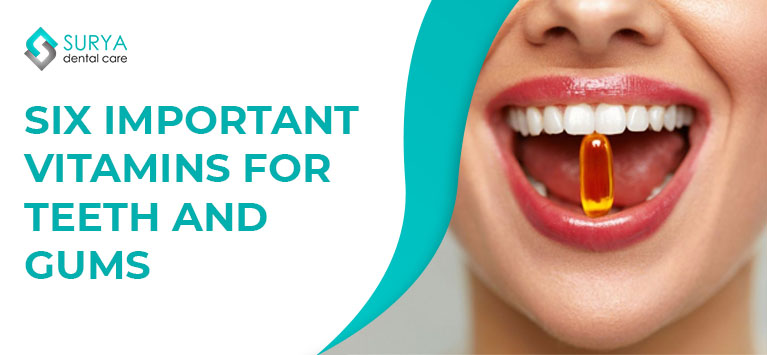
Healthy eating accompanied by regular physical exercise is the key for good health and protecting ourselves from various non-communicable diseases. Right?
Similarly, maintaining a dental-friendly diet along with oral hygiene activities are essential for healthy teeth and gums. In essence, impeccable oral care should include eating foods, drinks, and supplements enriched with essential vitamins & minerals for our oral health.
If you care about your teeth and gums, then indulge those nutrients in your diet. Keep reading to ascertain them.
1) Calcium
Similar to bones, calcium forms the building blocks of teeth. If you are deficient in calcium, your body will take this nutrient from teeth and bones to regulate the muscle functionalities. This will weaken your teeth and eventually lead to teeth loss. Hence you should take calcium-rich foods to fortify your teeth as well as bones.
You might know that dairy products are abundant in calcium. Here are some non-dairy sources of calcium:
- Almonds
- Beans
- Lentils
- Pineapple chia seeds
- Broccoli
- Finger Millet
- Dried figs
- Leafy greens
- Sesame seeds
- Sweet Potatoes
2) Potassium
Potassium helps in blocking the substances that weaken our bones. Likewise, it plays a crucial role in regulating blood acidity. When our blood becomes too acidic, it causes dry mouth and absorbs calcium for the teeth. Thus potassium safeguards your teeth and jaw bone exceptionally.
Because of this, potassium nitrate is added as an ingredient in toothpaste. Many fruits and vegetables contain a high amount of potassium. Here are some:
- Bananas
- Tomatoes
- Mushrooms
- Avocados
- Cucumbers
- Peas
- Dark leafy greens (Eg: Curry leaves)
- Pumpkins
The following fish varieties are also a great source of potassium:
- Tuna
- Rockfish
- Halibut
- Cod
- Trout
3) Phosphorous
Calcium should be accompanied by phosphorous to fully absorb into our body. In simply, phosphorous is inevitable to enjoy the benefits of calcium. Except for dairy foods, many non-dairy products do not contain the required level of phosphorus. It prompts us to take foodstuffs loaded with phosphorous. Here are some:
- Egg
- Paneer
- Red meat
- Seafood
- Soy
- Peas
- Whole grains
4) Vitamin D
In general, Vitamin D plays an important role in managing our immune system so that it empowers the teeth to fight against bacteria attacks. Similarly, Vitamin D allows our digestive system to absorb calcium from the foods we take for remineralization activities.
In essence, Vitamin D takes care of rebuilding a tooth’s bone structure to prevent cavities. You can easily get this through various fruits, and vegetables. Some Vitamin D sources are as follows:
- Soybeans
- White beans
- Spinach
- Mushrooms
- Orange juice
- Almond milk
- Cod Liver Oil
If you are a non-vegetarian, you can get Vitamin D from raw oysters, and fish varieties like salmon, herring.
5) Vitamin A
Vitamin A is important for saliva production. Saliva is a natural cleaning agent and also has proteins, enzymes that aid in buffering, remineralization process also. We have noticed many people who have Vitamin A deficiency are suffering from oral problems like enamel hypoplasia, impaired tooth formation, periodontitis, etc.
Taking some of the following Vitamin A-rich food and supplements is the best way to overcome those problems.
- Carrots
- Sweet Potatoes
- Grapefruit
- Bell Peppers
- Papaya
- Broccoli
- Salad greens
- Mango
6) Vitamin C
Vitamin C benefits your teeth and gums. Besides fortifying your teeth, this nutrient takes care of strengthening the gum tissues, ligaments, connective tissues in your mouth. Moreover, vitamin C deficiency is associated with problems like weak dentin.
Luckily, you can overcome those problems by taking Vitamin C supplements. They are powerful antioxidants and take care of healing the gum tissues. This nutrient is highly found in the following fruits and veggies:
- Broccoli
- Sweet potatoes
- Citrus fruits
- Strawberries
- Grapefruits
- Kiwifruit
- Guava
- Mangoes
- Cabbages
On the other hand, Vitamin E is also helpful in preventing gum diseases in 2 ways (i.e.) acting as an antioxidant to fight against the oxidation of gum tissues and decreasing inflammation in the mouth. Aside from fruits, vegetables, Plant-based oils have plenty of this nutrient.
Remember that nutritional deficiencies are linked to inflammation, gum diseases, teeth loss, and much more. Eating healthy with high nutritional value is the simple way to safeguard your oral cavity and enrich your oral care regimen.



